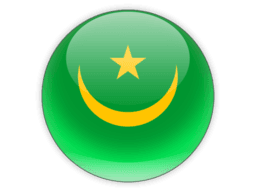
Cities of Mauritania
Discover 50 cities across 15 regions
Adrar(1)
Dakhlet Nouadhibou(1)
Gorgol(7)
Guidimaka(6)
Hodh Ech Chargi(9)
Hodh El Gharbi(3)
Inchiri(1)
Nouakchott Nord(1)
Nouakchott Ouest(1)
Nouakchott Sud(1)
Tiris Zemmour(1)
Other Cities (1)
Mauritania is a country located in Northwest Africa. It is bordered by the Atlantic Ocean to the west, Western Sahara to the north and northwest, Algeria to the northeast, Mali to the east and southeast, and Senegal to the southwest. The country is known for its vast deserts, ancient cities, and unique culture.
The capital city of Mauritania is Nouakchott, which is located on the Atlantic coast. Other major cities in the country include Nouadhibou, Rosso, Kaédi, and Zouérat.
The official language of Mauritania is Arabic, although French is widely spoken and is often used in government, education, and commerce. The country's population is largely made up of Arab-Berbers and black Africans, and the predominant religion is Islam.
Mauritania has a diverse economy that is based on agriculture, fishing, mining, and services. The country is a major exporter of iron ore, which is found in large deposits in the eastern part of the country. Fishing is also an important industry, and the waters off the coast of Mauritania are home to a wide variety of fish and seafood.
Tourism is a growing industry in Mauritania, although the country is not as well known as other African destinations. Visitors to Mauritania can explore the ancient city of Chinguetti, which is a UNESCO World Heritage site known for its beautiful mosques and historic libraries. Other attractions include the Banc d'Arguin National Park, which is home to a diverse range of bird species, as well as the Adrar Plateau, which is home to stunning landscapes and ancient rock art.
Mauritania has a hot and dry climate, with temperatures often exceeding 100°F (38°C) in the summer months. Visitors to the country should take precautions to avoid dehydration and heat stroke, especially if traveling during the hottest months of the year.
Telephone Code
222
Local Emergency Phone
Fire: 118; Police: 117
Vaccinations
An International Certificate of Vaccination for yellow fever is required for travelers arriving from countries with a risk of yellow fever transmission and for travelers having transited through the airport of a country with risk of yellow fever transmission. See WHO recommendations. On 21 March 2022, the US Centers for Disease Control and Prevention (CDC) issued a Travel Alert for polio in Africa; Mauritania is currently considered a high risk to travelers for polio; the CDC recommends that before any international travel, anyone unvaccinated, incompletely vaccinated, or with an unknown polio vaccination status should complete the routine polio vaccine series; before travel to any high-risk destination, CDC recommends that adults who previously completed the full, routine polio vaccine series receive a single, lifetime booster dose of polio vaccine.
Climate
Desert; constantly hot, dry, dusty
Currency (Code)
Ouguiyas (MRO)
Electricity/Voltage/Plug Type(s)
220 V / 50 Hz / plug types(s): C
Major Languages
Arabic, Pular, Soninke, Wolof, French
Major Religions
Muslim 100%
Potable Water
Opt for bottled water
International Driving Permit
Suggested
Road Driving Side
Right
Tourist Destinations
Banc d'Arguin National Park; Nouakchott; Ouadane, Chinguetti, Tichitt, & Oualata; Richat Structure in the Sahara Desert
Major Sports
Soccer, basketball
Cultural Practices
When talking about the past, people will often snap their fingers by their shoulders.
Tipping Guidelines
A tip of 12-15% is expected in restaurants if no service charge has been added to the bill. Hotel service staff and drivers welcome small tips.
Souvenirs
Dyed leather goods, silver jewelry and engraved items, woven rugs/carpets and hand-dyed fabric, knives; neolithic pottery, arrowheads, and other items
Traditional Cuisine
Thieboudienne — fish and rice served in a white and red sauce, usually made from tomatoes
Geography
Area
total: 1,030,700 sq km
land: 1,030,700 sq km
water: 0 sq km
Climate
desert; constantly hot, dry, dusty
Natural resources
iron ore, gypsum, copper, phosphate, diamonds, gold, oil, fish
People and Society
Population
4,244,878 (2023 est.)
Ethnic groups
Black Moors (Haratines - Arabic-speaking descendants of African origin who are or were enslaved by White Moors) 40%, White Moors (of Arab-Berber descent, known as Beydane) 30%, Sub-Saharan Mauritanians (non-Arabic speaking, largely resident in or originating from the Senegal River Valley, including Halpulaar, Fulani, Soninke, Wolof, and Bambara ethnic groups) 30%
Languages
Arabic (official and national), Pular, Soninke, Wolof (all national languages), French; note - the spoken Arabic in Mauritania differs considerably from the Modern Standard Arabic used for official written purposes or in the media; the Mauritanian dialect, which incorporates many Berber words, is referred to as Hassaniya
Religions
Muslim (official) 100%
Population growth rate
1.96% (2023 est.)
Government
Government type
presidential republic
Capital
name: Nouakchott
Economy
Economic overview
lower middle-income West African economy; primarily agrarian; rising urbanization; poor property rights; systemic corruption; endemic social and workforce tensions; wide-scale terrorism; foreign over-fishing; environmentally fragile
Real GDP (purchasing power parity)
$24.494 billion (2021 est.)
Real GDP per capita
$5,300 (2021 est.)
Agricultural products
rice, milk, goat milk, sheep milk, sorghum, mutton, beef, camel milk, camel meat, dates
Industries
fish processing, oil production, mining (iron ore, gold, copper)
Exports
$3.18 billion (2021 est.)
Exports - partners
China 32%, Switzerland 13%, Spain 9%, Japan 9%, Italy 5% (2019)
Exports - commodities
iron ore, fish products, gold, mollusks, processed crustaceans (2019)
Imports
$4.312 billion (2021 est.)
Imports - partners
China 26%, France 6%, Spain 6%, Morocco 6%, United Arab Emirates 5% (2019)
Imports - commodities
ships, aircraft, wheat, raw sugar, refined petroleum (2019)
International Airports in Mauritania
Discover 2 major airports serving Mauritania
Mark Mauritania as Visited
Add Mauritania to your personal travel map and track your journey around the world. Share your adventures and see your progress grow!